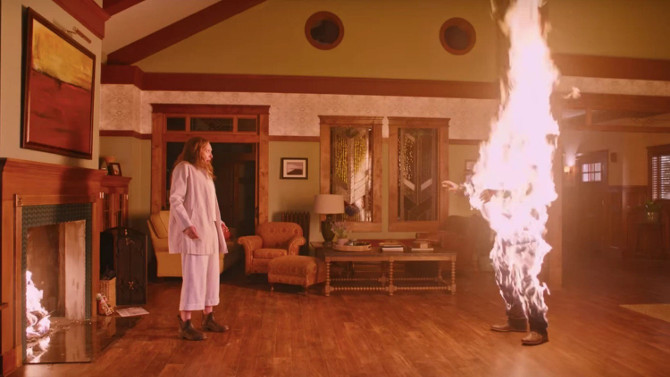The obituary – the last call, the final farewell, the closing shindig (likely the only remaining time you’ll be the centre of attention), basically a public invite looking for a person’s friends and family to come together for one last time to say goodbye, to tell stories, and to find some solace in closing the book on a man or woman’s story. . . but is it truly the end?
Opening with an obituary, first time filmmaker Ari Aster’s Hereditary transports us into a reeling family dynamic, a group that have about as much promise in their lineage as the Usher’s (the Edgar Allan Poe characters, not the hip hop/pop artist). With mental illness coursing through their blood, Annie Graham (Toni Collette) did not exactly have a great relationship with her mother – often estranged, the elderly lady, who lived with dissociative identity disorder, ended her days dealing with dementia, further adding to the enigma that was her highly private life.
The only person in her family to have a normal life, Annie is married to the very relaxed Steve (Gabriel Byrne), they have two children, Peter (Alex Wolff) and Charlie (Milly Shapiro). Living in quite the impressive abode, Annie spends her days toiling away at extremely intricate miniature models – the opening scene is a fascinating pan that takes us from an exterior viewpoint (looking through a window to Charlie’s treehouse), around her workspace and into one of the replicas, it slowly becoming real life.
All grieving in their own way, it is quite clear that this horror film has an intense backbone that revolves around both the above mentioned mental illness and how people manage tragedy. Annie has an adrenaline fuelled anxiousness, a mania that drives her not only to often blame herself, but also search for answers in unusual places, while Steve internalizes everything (pulling himself away from the chaos, rotting on the inside), and their son wallows in a haze of pot whilst punishing himself physically – even though this may be horror-influenced. As for their daughter, let’s just say Charlie, who has the habit of clicking her tongue, is almost unearthly. . . cutting the head off of a dead bird has got nothing on those thousand-yard staring eyes.
Perhaps best compared to Rosemary’s Baby, the fresh spin on the iconic tale also throws in touches of other classics – The Omen, The Changeling, The Exorcist and The Amityville Horror, to name but four others. Then, there are its gothic elements. Steeped in liberal doses of the uncanny, it is like that opening shot, not quite sure if we are looking at reality or the diorama. . . or as Poe put it in ‘The Fall of the House of Usher’, “with an utter depression of soul which I can compare to no earthly sensation more properly than to the after-dream of the reveller upon opium–the bitter lapse into everyday life–the hideous dropping off of the veil”, a perfect description of the gloomy madness that besets the family and their home. There is also an ode to the original Halloween, as Peter’s class has a similar discussion to Laurie’s (Jamie Lee Curtis) – both on ‘escaping fate’. . . another theme of the film.
For a good portion of the feature, less is more, the slow-burner building an eldritch (that is weird, sinister and ghostly) mood through sharp direction (the camera always lingering at an off speed, as if a bit unhinged. . . it warning of impending danger – sharp objects cleverly catch our eye), evocative cinematography (by Pawel Pogorzelski), clever sound design, a quality composition (by Colin Stetson), and solid acting. . . though there are hints for keen observers or knowledgeable movie buffs – after all, coincidences are never coincidences in horror movies, while warning signs are slyly inserted like deformed puzzle pieces. And, like many of the best films, not all are answered completely, leaving much of the onus on the audience to decipher exactly what we have experienced (I know I need another viewing to continue a theory I am working on).
Though I cannot claim to have loved this one, Hereditary is a quality film. Constructed with great care, it somewhat felt like Get Out to me, which I enjoyed, but left me wanting more (for all the good in it, it never truly made the little hairs on the back of my neck stand up – which is funny, as so many critics have discussed how they watched much of Hereditary through their fingertips). What it does have though, is a much deeper meaning, subtly speaking to both mental illness and grieving in very realistic ways for a horror film – each new crushing happening or mental wound chipping away at that protective barrier we human beings build, the family deteriorating under the crippling weight placed on their shoulders (soon, old traumas are used as weapons, unity and trust ebbing away, fear and paranoia severing the remaining tethers grounding them to life, love and reality). Yet, the horror elements always linger, executed in ways that are rarely expected (a shadow of what looks to be Annie’s mother an early example, as for the climax, wait and see). And, then there is a jump scare. . . a wholly original, rather quiet take on the traditional cheap thrill that deserves pointing out (you’ll know what I am talking about). What possesses us to see horror films – the excitement of bowing down in fear, hiding our eyes as we enter the treehouse of horror, the primordial recesses of our mind being played with by the next crowning achievement of the genre – in the end, who knows?


